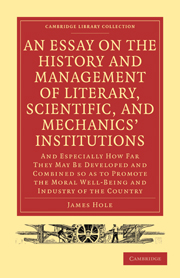 An Essay on the History and Management of Literary, Scientific, and Mechanics' Institutions
An Essay on the History and Management of Literary, Scientific, and Mechanics' Institutions Published online by Cambridge University Press: 05 October 2010
The results of the exhibitions at Manchester and Sheffield have been so important, whether the pecuniary gain, the gratification of taste, the encouragement of a love for science, or the awakening a new appetite amongst the vast operative population of those towns be regarded, that it would be unpardonable to omit giving a few hints in this report on the manner of forming and undertaking them ; observing, in the outset, that the very smallest Institution need not be discouraged by the hopelessness of rivalry with the Manchester and Sheffield Exhibitions, since the experience of the promoters of those has clearly shown that the scale of exhibition has in each instance so far exceeded the most sanguine expectations, as to warrant the belief that, in smaller towns, it is practicable to collect a valuable and interesting exhibition.
The procedure, in the collecting of the exhibitions at the towns above named (and a very similar plan has been adopted at Leeds), may be thus succinctly stated.
In the first place, the committee of the Institute has invited and secured the assistance of gentlemen of public spirit and influence, and added them to its number, to form an exhibition committee; a large committee is not desirable, being unwieldly. The next stept has been to issue a prospectus, explaining the nature, extent, and object of the exhibition, either as a circular, or as an advertisement, or both, and soliciting loans of paintings, specimens of natural history, models, &c. &c.
To save this book to your Kindle, first ensure [email protected] is added to your Approved Personal Document E-mail List under your Personal Document Settings on the Manage Your Content and Devices page of your Amazon account. Then enter the ‘name’ part of your Kindle email address below. Find out more about saving to your Kindle.
Note you can select to save to either the @free.kindle.com or @kindle.com variations. ‘@free.kindle.com’ emails are free but can only be saved to your device when it is connected to wi-fi. ‘@kindle.com’ emails can be delivered even when you are not connected to wi-fi, but note that service fees apply.
Find out more about the Kindle Personal Document Service.
To save content items to your account, please confirm that you agree to abide by our usage policies. If this is the first time you use this feature, you will be asked to authorise Cambridge Core to connect with your account. Find out more about saving content to Dropbox.
To save content items to your account, please confirm that you agree to abide by our usage policies. If this is the first time you use this feature, you will be asked to authorise Cambridge Core to connect with your account. Find out more about saving content to Google Drive.